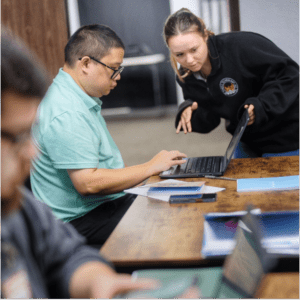17 year-old Inika Singh interviews program administrator Bailey Comstock on how the California firm is helping those with intellectual disabilities

Bailey Comstock assisting participants in hands on job readiness learning workshops.
April 25, 2024
How a fire helmet company is revolutionizing workplace inclusion
A fire helmet manufacturing company in California wants to increase employment for individuals with intellectual or developmental disabilities (IDD) via an innovative education and working program.
Phenix Technology’s initiative, Opportunity for All program, provides classroom learning for half a day and work at the company for the other half.
In 2022, only 13.8% of individuals with intellectual disabilities in California were employed, compared with the general population at 61.9%. This is partly due to limited employer knowledge and a lack of support. Phenix’s program, in operation since 2021, is dedicated to improving this employment rate. But it is also a smart business move.
Phenix, founded in 1972, is a firefighting equipment provider that creates a variety of high-quality products used by first responders globally. The company was founded by fire captains who needed aerodynamically designed helmets, touting familial values and rich history as its foundation for innovation.
Program administrator Bailey Comstock states, “Bottom line is: you hire adults with disabilities, you’re going to save money, and you’re going to make money.” Businesses that hire people with disabilities report a 90% increase in the retention of valued employees and a 72% increase in employee productivity.
Continuing how “most people want to treat [neurodiverse individuals] differently because, ‘oh, I don’t want to offend, I don’t want to hurt their feelings, I don’t want to discourage them.’ But that’s holding them back. That’s creating a ceiling for them that shouldn’t be there.”
Providing an Opportunity for All
In the current model, four participants with intellectual or developmental disabilities such as autism, Down syndrome, or bipolar disorder spend 11 weeks at the company with their job coaches. These are provided through service agencies such as Exceed and Westview, which are funded through the state of California.
In the mornings, the participants complete job readiness workshops. Comstock teaches them how to create resumes, apply for jobs, set up LinkedIn accounts, perform an elevator pitch, and benefit from job fairs. They also learn how to be flexible at the workplace, communicate with co-workers and supervisors, and what meeting etiquette to display.
In the afternoons, the participants work in the production facility – producing, painting, sewing, and shipping the helmets.
However, there are other barriers to employment that are not discussed or acknowledged. Many businesses have preconceived notions of inadequacy, so people with disabilities are often not taught the relevant skills. To combat this, Comstock states that while “talking about [the barriers]. We’re being very candid, and then we’re teaching them. This is how you approach it. This is how you advocate for yourself.”
For the participants learning these skills, it also functions as a motivational and confidence-building tool.
“For a lot of our participants, the world has beat them down. They’re told what they can’t do. They’re told what they can’t reach… and we start telling them the complete opposite… you are superhuman, and while some people may see a disability, we consider that you have different abilities,” Comstock says.
The results have been very promising. One program alumni now works for the American Medical Response Team, stocking ambulances. Another works at a construction insurance bonding company, studying for notary exams to complete the job with more accuracy.
One participant has autism and is deaf. He refused to learn sign language, which was a barrier to his independence. Comstock explains, “he came in day one, not looking at anyone, running away from people, not interacting, basically rejecting everything.” Phenix was his first work experience ever.
Now, he helps new participants by helping them complete tasks without speaking. Comstock’s biggest success story, she says, is someone who went from “screaming at people to today… willingly… helping them and training [the cohorts].”
The benefits of hiring neurodiverse employees
The California Department of Rehabilitation is a government agency that assists those with disabilities who are looking for jobs, helping them obtain independence and equality in their desired workplace.
This is through vocational rehabilitation programs that provide funding to businesses so they can create sustainable programs that lead to increased community service without bankrupting smaller companies.
Ginger Esqueda, the assistant to the CEO of Phenix, also highlights the benefits of hiring neurodiverse individuals while holding other businesses accountable. “We want to make sure that we are truly an equal opportunity employer. A lot of jobs say they’re equal opportunity, and they’re really not,” Esqueda says.
Comstock hosts seminars for businesses to educate them about the importance of having diverse hiring policies, as “hiring neurodiversity with various disabilities is a financial and business smart decision.”
IDD employees are loyal, as they find enjoyment, purpose, and fulfillment in work. The majority blossom into kind and sensitive people, which boosts company morale. In addition, their productivity is high, as IDD employees tend to be determined, skilled, and focused on work.
Learn more:
According to a 2021 journal article on the economic benefits of hiring those with intellectual disabilities, Asperger Informatik, a Swiss company, prefers employing individuals with Asperger’s syndrome due to their intellectual gifts, quick grasp, attention to detail, concentration, tenacity, and perseverance.
Individuals with disabilities demonstrate customer-friendly interactions, consistency, and creative problem-solving abilities.
One misconception is that workers with disabilities require different treatment. Less than 40% of workers with disabilities need this, but such costs are usually offset by an increase in productivity.
What’s next?
The Opportunity for All program is successfully completing its second cohort. Phenix will continue the program and advocate for neurodivergent hires.
They are writing a book on how businesses should hire neurodiverse and how to get hired as a neurodivergent individual.
However, their goal is to be forgotten. Comstock argues, “We want someone to be like, ‘Who was that company again that started this initiative?’ It was us but we don’t want to be remembered. We just want it to be normal and so that’s the passion behind all of this.”
The core of a meaningful societal transformation may be found in Phenix ’s vision – a world in which diversity is not an exception but an intrinsic element of everyday business.






